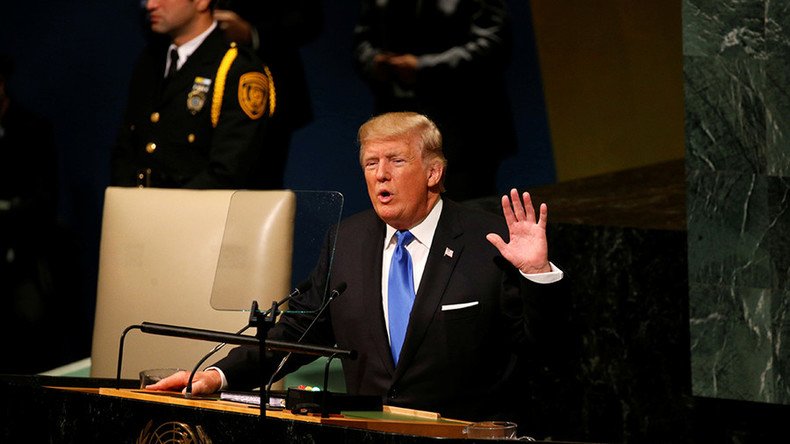The floor of the United Nations General Assembly (UNGA) will long echo from US President Donald Trump’s military grandstanding against Iran and North Korea. In fact, it is likely his tirade will be remembered as the start of the sunset on the American empire.
While I’m sure Donald Trump intended his address to project America’s hegemonic power to the extent that all nations would come to understand the pointlessness of their resistance, I fear such bombastic bravado betrays Washington’s deep-seated insecurity. Whether the United States cares to admit it or not, the fact is its power is waning.
Whether it is Washington’s propensity to pursue foreign-policy making from a military perspective, or its inability to assert control on the many fronts it has opened up overseas, America is paying the price of its relentless ambitions.
Never mind the fact that a formerly gullible public is now becoming suspicious of the many lies the neocons have posited in the name of war: Afghanistan, Iraq, Syria, Yemen … how many wars can one country run before war becomes its sole raison d’etre - the very matrix upon which its existence is anchored? Therein I would say is the root of America’s demise.
America’s love affair with its military complex will prove to be its Achilles’ heel. Empires are bound to disappear, and territorial ambitions broken before that of others. The US, one may argue, is living on borrowed time now that other powers have emerged - pertinent to this article, the Islamic Republic of Iran.
Allow me to offer a theory to America’s antagonism toward Iran. The context here is essential. Let us just assume that there is more to Washington’s ire than a democratic hungering, especially if we consider that Iran, despite what we hear in the media, is a well-adjusted democracy. If we are to be rational in our analysis, we must recognize that America’s fallout with Iran has very little to do with the fashion of its governance and everything to do with the fact that Iran proclaimed itself sovereign and independent in its territory.
Such independence of course translated into the nationalization of Iran’s natural resources and a revamp of its position toward Western capitals. While such a decision certainly left a sizable gap in Her Majesty’s coffer (aka Great Britain), one ought to be careful when denying a country the right to self-governance - especially since Western democracies thrived on the very principle of sovereign political self-determination.
The Washington-Iran binary exists out of a need to control natural resources and military waterways. I would ask here some license from readers as I am forced to simplify what otherwise would require several books. To better appreciate America’s profound antipathy for Iran, one must cast one’s eyes to pre-1979 Iran, when the Shah still entertained his Western guests to the tune of lavish parties and obscene displays of wealth.
A giant sitting at the heart of the Islamic world, Iran’s wealth guarantees that its leadership will enjoy tremendous political traction both regionally and on the global scene. It is how such traction would manifest which irks the United States.
Last month, Henry Kissinger argued that Iran would soon rise as an empire should ISIS be destroyed, betraying Washington’s innermost fear, and one may even find America’s direct ties to terrorism. It is rather clear from Kissinger’s comments that ISIS has acted somewhat of a buffer to Iran’s geopolitical reach in the Greater Middle East region.
He wrote: “The outside world’s war with ISIS can serve as an illustration. Most non-ISIS powers — including Shia Iran and the leading Sunni states — agree on the need to destroy it. But which entity is supposed to inherit its territory? A coalition of Sunnis? Or a sphere of influence dominated by Iran?”
I read two things in those comments:
One, Kissinger still holds to the binary architecture he believes will best guarantee regional insolvency, and thus secure America’s dominance - that notion that Sunni and Shia Islam must absolutely exist in antagonism when really so very few differences set them apart. Sectarianism continues to serve as an asymmetrical weapon of war, it is not contextual to the Islamic world, and it certainly has nothing to do with how nations have defined their sovereign identity.
Two, Kissinger exposed America’s inherent fear that an independent Iran will serve as both a model and an inspiration for other nations in the immediate region to stand free within their borders. ISIS we might as well come to terms with is nothing but a valuable asset wielded by imperial powers to together justify military interventionism, and sow discord at the heart of a region with immense geopolitical power.
In short, America’s future relevance is reliant upon Washington’s ability to distort ideologies, explode territorialities and promote sectarian-based terrorism in the Mid-East. Iran’s re-emergence onto the regional and international scene is here but a by-product of America’s imperial folly.
Contrary to common belief Iran does not harbor colonial ambitions. Iran, in fact, has been a fervent advocate for political independence on the basis it has claimed its own away from tyranny. In a speech at a conference on Palestine in late February both Ayatollah Khamenei and Ali Larijani insisted on the need to promote independence and political self-determination as the bedrock of peace and stability.
Such a position was echoed by Seyed Ibrahim Raisi, custodian and chairman of Astan Quds Razavi when he insisted to me that “Iran does not seek to export its system of governance only our principles of justice and fair representation.”
He added: “Iran will always come to the help of those who call upon it.”
And NO, Mr. Kissinger, Iran is by no means radical in its makeup. It may still be a working democratic progress … which nation can claim to democratic absolutism? But Iran is nevertheless a far more progressive state than many of the US so-called ‘friends'.
The statements, views and opinions expressed in this column are solely those of the author and do not necessarily represent those of RT.



